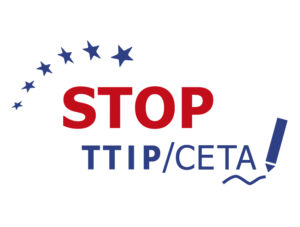Bruselas deja fuera de juego a los Estados miembros con el tratado de libre comercio CETA
El pasado martes, el presidente de la Comisión Europea, Jean-Claude Juncker, anunció a Holanda que los parlamentos nacionales de los Estados miembros no tienen nada que decir sobre la aprobación o rechazo del CETA, el tratado de libre comercio entre la UE y Canadá. La semana pasada, Marianne Thieme solicitó en el parlamento holandés un debate sobre la cuestión con los miembros del gabinete de gobierno. La propuesta obtuvo el respaldo de una mayoría parlamentaria. Este tratado de libre comercio otorga más poder a las multinacionales y supone una amenaza para la democracia y los estándares de seguridad alimentaria, privacidad, bienestar animal y medioambiente. El Partido por los Animales de Holanda está en contra del CETA y quiere un referéndum. Un tratado con consecuencias de tanto alcance debe someterse al criterio de los parlamentos nacionales de la UE y de los propios ciudadanos.

Sin embargo, el señor Juncker, presidente de la Comisión Europea, quiere dejar fuera de juego a los parlamentos en el proceso de aprobación o rechazo del CETA. Este tratado de libre comercio entre la UE y Canadá no solo constituye una seria amenaza para la democracia, el bienestar animal, la naturaleza, el medioambiente y los agricultores y ganaderos holandeses, sino que también es una vía indirecta de acceso al mercado europeo para empresas americanas con filiales en Canadá. Por ello, el Partido por los Animales considera de la máxima importancia que Holanda disponga de la posibilidad de decir no al CETA de forma independiente. Por iniciativa de Marianne Thieme, el parlamento holandés debatirá la cuestión con el ministro de Comercio Exterior después del parón veraniego.
Thieme: “Si fuera por Juncker, el CETA entraría cuanto antes en vigor, sin consultar primero a los ciudadanos o a los parlamentos de los Estados miembros y sin esperar siquiera la recomendación del Tribunal de Justicia de la UE. Holanda tiene que poder decidir si acepta o rechaza el CETA, al menos en el parlamento, pero preferiblemente mediante un referéndum.”
Last Tuesday, the European Commission chairman Juncker informed the Netherlands that the national parliaments of the member states have no say in whether the EU enters the CETA agreement – the free trade agreement between the EU and Canada – or not. Marianne Thieme requested the cabinet for a debate last week. The majority of the Lower House backed this request. The free trade agreement gives more power to multinationals and threatens democracy and standards in the area of food safety, privacy, animal welfare and the environment. The Party for the Animals is against CETA and wants a referendum. Such far-reaching free trade agreement must be brought before the national parliaments in the EU and the EU people.

The EU chairman Juncker wants to sideline national parliaments regarding the approval or rejection of CETA. The free trade agreement between the EU and Canada is not only a serious threat to democracy, animal welfare, nature, the environment and Dutch farmers, but it is also a backdoor to the European market for American companies that have a subsidiary in Canada. For that reason the Party for the Animals believes that it is of the utmost importance that the Netherlands has the possibility to say no to the CETA independently. At the initiative of Marianne Thieme, the Lower House will go into debate about this with the Minister of Foreign Trade after summer recess.
Thieme: “As far as Juncker is concerned, CETA will take effect as soon as possible, without consulting EU citizens or independent parliaments and even without waiting for the advice of the Europe Court of Justice. The Netherlands should be allowed to say yes or no to CETA. Preferably by referendum, but at least in the Lower House.“